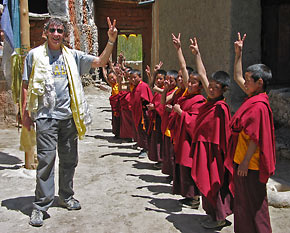UC Berkeley Web Feature
The Blum Center: Q&A with Richard Blum
BERKELEY – Public Affairs recently spoke with Richard Blum at University House on the UC Berkeley campus about his $15 million gift to the campus to launch the Richard C. Blum Center for Developing Economies. He talked about what the Blum Center will do, what inspired him to make the gift, and how UC Berkeley is ideal, and eager, for such a center.
Q: What is the Blum Center for Developing Economies? What will it do?
 'UC Berkeley's always been a place of activism, of new ideas, of compassion and wanting to help people, whether domestically or internationally. And I have encountered nothing but enthusiasm from the faculty, from the people putting this center together.' -Richard C. Blum |
The center also will take the expertise of the university, the professors, the students, to launch specific projects to bring about solutions in a country, a village, a region. There is a growing disparity in the world between rich and poor. Globalization has a lot of winners, but there are a lot of losers. There are billions of people on the planet who live in grinding poverty and ignorance. And if you can educate them, create an opportunity for a decent standard of living, you are going to have fewer political problems.
Q: You've called UC Berkeley the perfect place for the Blum Center. Why?
A: UC Berkeley's always been a place of activism, of new ideas, of compassion and wanting to help people, whether domestically or internationally. When the idea (for the center) hit me, Chancellor Birgeneau immediately said, "I think that's terrific." And I have encountered nothing but enthusiasm from the faculty, from the people putting this center together. I couldn't be happier with the response.
Q: What motivated you to make this gift to UC Berkeley?
 Richard Blum shares the Berkeley spirit with smiling young monks in the community of Mustang, in northwestern Nepal, in May 2003. (Pshering Dorjee photo, courtesy the American Himalyan Foundation) |
A: My interest in foreign assistance really goes back to 1968. Ever since I was a small boy, I'd always wanted to go to Nepal, Tibet, see the Himalayas, and I had to go to Bangkok on business. And in those days, nobody knew where Nepal was. I spent three weeks walking through the mountains out to the Tibetan border and back, never saw another foreigner. I fell in love with the people and their culture and their kindness and compassion.
I started helping people in Nepal informally, then in 1980 we set up the American Himalayan Foundation. I have funded a policy think tank at the Brookings Institute, trying to bring about a change in the global economy.
Q: Some of your closest friends are the Dalai Lama, Jimmy Carter and Sir Edmund Hillary. How have these individuals influenced your view of the world and your philanthropy?
A: Along with my wife, these people have inspired me the most to do these things. Ed Hillary taught how you can go from village to village to get to know the people, to be friends with them, to find out what it is they want, and help them solve their problems. And it is amazing how very little money can make a difference in lives. The Dalai Lama's religion is about kindness, it's about compassion. Jimmy Carter has probably done more for the developing world than almost anybody I know. That's what he's dedicated his life to, particularly to health care in Africa. The Carter Center, where I've been privileged to serve as a board member for close to a decade, is a bigger version of the American Himalayan Foundation. And you just see lives change.
Q: President Kennedy also was a big influence in your life. In what way?
A: When I think about how we can inspire the next generation, I harken back to President Jack Kennedy's inaugural address. We all know the buzzwords, but if you look at his entire address, I'd say well over half of it talked about our commitment to the rest of the world. It's that kind of inspiration and philosophy that makes me want to do this — and the fact that I went to UC Berkeley.
Q: What kinds of projects do you envision the Blum Center undertaking?
A: Here's an example: We can't wire the world, but perhaps we can find one or two remote countries and get information systems to people. I know a Sherpa who lives in a very remote part of Nepal who's earned his master's degree in environmental studies by distance learning.
IT also would help people learn how to grow better crops, know what consumers want. What these little countries have to sell, by and large, is agriculture.
People with businesses in remote places are making handicrafts that they can only sell to the local distributor, the local purchaser, and it takes three or four levels of marketing before an item can get to retail. I see Tibetan carpets being sold over here for five to six times the price of what you can buy them for in Katmandu. It should cost more here, but not six times as much. With IT, people could sell things direct.
Q: Do you have a philosophy about helping others?
A: I think we have good lives, to a certain extent, because of an accident of geography. We happen to be born in the United States where we are blessed with a system that is reasonably fair, not always. That gives you ample opportunity to succeed. I have been lucky in my life in terms of having a wonderful family and being financially successful. But most people don't live as well as we live. We have an obligation not only to help them because it's the right thing to do, but at the end of the day grinding poverty and ignorance is destabilizing and can eventually hurt us all.

